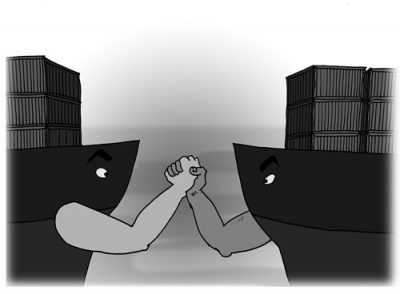Are We Heading for a Major US-China Trade War?

VISIT MY NEW WEB SITE:
Contact at [email protected].
According to China’s Global Times, “(t)he probability for a trade war is increasing” – so far no bilateral talks held, differences between both sides widening.
“The US action has reinforced a notion in China that this is no ordinary trade war but a strategic move to counter China’s rise and perpetuate the overall advantage of the US,” said GT, making it harder to resolve differences.
Beijing fears Trump aims to harm its core economic interests, aiming to keep it from surpassing America as the world’s dominant economy.
It’s already the largest industrial country, surpassing America as well in savings, trade and GDP based on purchasing power parity (PPP) – an exchange rate between currencies measured by the cost of a representative basket of goods in one country v. another.
China’s growth through the years was much more robust than many economists expected. In 2005, it was less than half the size of America’s.
By next year, it’s expected to be 20% larger on a PPP basis. Its phenomenon reflects overall emerging market growth v. developed ones.
In 2007, they accounted for around half of global output. By the 2020s, they may surpass two-thirds.
China’s growth since 1979 is one of the greatest economic success stories in modern times.
After nearly four decades of extraordinary growth, Beijing wants higher-quality development achieved, including by promoting greater domestic consumption at the expense of direct foreign investments while maintaining or increasing its exports.
Economist Joseph Stiglitz accused Trump of “inflaming passions and taxing US relationships with key allies,” adding
“(H)is actions are motivated by pure politics. He is eager to seem strong and confrontational in the eyes of his electoral base.”
“(W)hat matters is the multilateral trade deficit, not bilateral trade deficits with any one country.”
His scheme won’t produce domestic jobs. Fewer imports from China would increase them from other low-wage countries.
Where new US manufacturing jobs are created, they’re increasingly performed by robots in many cases.
China appears unwilling to compromise its growth plan. Trump believes President Xi will yield to his demands, casually saying “it is the right thing to do.”
Treasury Secretary Mnuchin thinks a trade war is possible, though doesn’t expect thing to go this far.
Increasing loss of US dominance to emerging economies is what the bilateral trade dispute is mostly about, China the largest of these economies, others chipping away against US market share as well.
They’re also gaining greater technological competence at America’s expense.
Waging a trade war with China would makes matters worse, not better. Beijing may make modest adjustments to appease Trump.
It’s not likely to compromise on its longterm growth and development strategy.
“(T)he balance of power has changed from six decades ago,” said GT, adding:
“Today’s trade war will be fought between two relatively equal powers. The absolute advantage is Washington’s bluff.”
“Beijing is capable of hurting Washington in every trade battle, making the US suffer the same losses as China suffers.”
“Let the two systems engage in this trade war competition. When the fight begins, we will see which one is more capable of persisting.”
The above remarks don’t sound like China intends backing off – girding itself for trade war if things go this far.
*
Stephen Lendman is a Research Associate of the CRG, Correspondent of Global Research based in Chicago.
VISIT MY NEW WEB SITE: stephenlendman.org (Home – Stephen Lendman). Contact at [email protected].
My newest book as editor and contributor is titled “Flashpoint in Ukraine: How the US Drive for Hegemony Risks WW III.”

